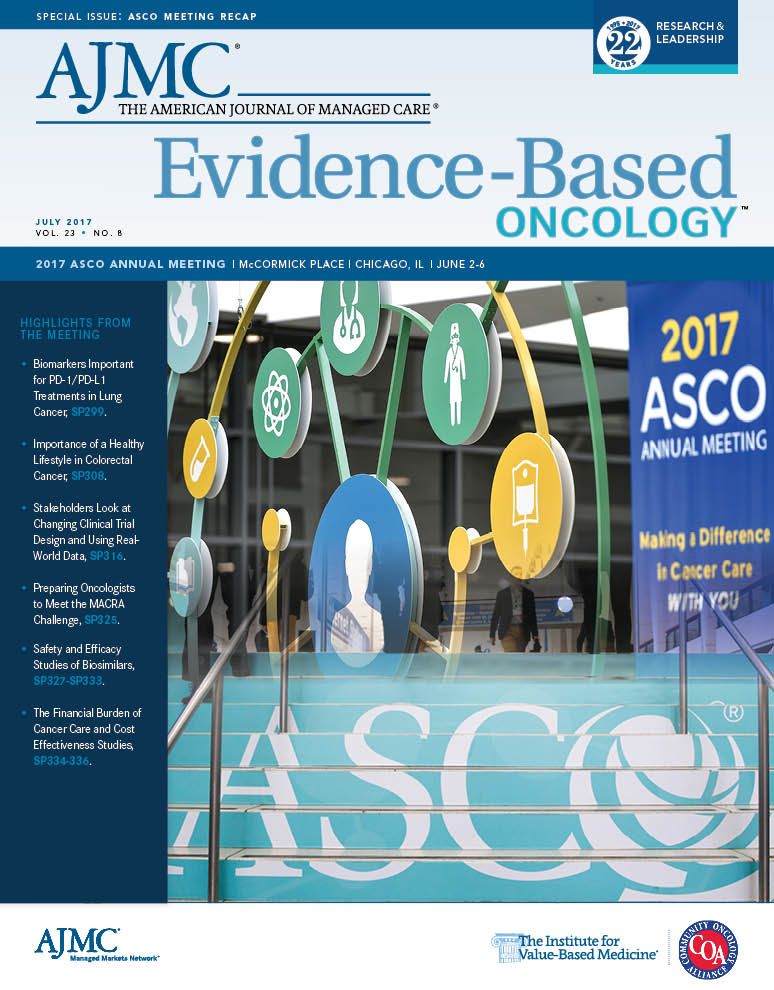- Center on Health Equity & Access
- Clinical
- Health Care Cost
- Health Care Delivery
- Insurance
- Policy
- Technology
- Value-Based Care
Nivolumab, Alone or With Ipilimumab, Met the Disease Control Rate in Malignant Pleural Mesothelioma
In a late-breaking abstract at the 2017 American Society of Clinical Oncology Annual Meeting, researchers presented an interim analysis of a randomized phase 2 trial of second- or third-line nivolumab, with or without ipilimumab, in patients with second- or third-line malignant pleural mesothelioma.
IN AN INTERIM ANALYSIS
of the Intergroupe Francophone de Cancérologie Thoracique (IFCT) 1501 MAPS2 randomized phase 2 trial of second- or third-line nivolumab, with or without ipilimumab, in patients with second- or third-line malignant pleural mesothelioma, both arms met the primary endpoint of disease control rate (DCR) at 12 weeks. This interim outcome was reported as a late-breaking abstract at the 2017 American Society of Clinical Oncology Annual Meeting.1
No treatment is recommended in patients with malignant pleural mesothelioma whose disease progresses after first-line pemetrexed-platinum doublet. The DCR is <30% with all drugs tested in second-line setting.
Preliminary results suggested the possible activity of anti-programmed death 1 (PD-1) monoclonal antibodies in the second or third line, as opposed to single agent anti-cytotoxic T-lymphocyte-associated protein 4 (CTLA-4) monoclonal antibodies. Anti—PD-1 monoclonal antibody efficacy, therefore, deserves confirmation. However, the efficacy of combining an anti–PD-1 and an anti–CTLA-4 monoclonal antibody is unknown in malignant pleural mesothelioma.
The investigators of this study set out to test the hypothesis that inhibition of immune PD-1 with or without CTLA-4 checkpoint inhibition would delay tumor progression in patients with unresectable malignant pleural mesothelioma whose disease progresses after 1 or 2 lines of chemotherapy, including at least first-line pemetrexed and platinum. They also hypothesized that quality of life (QOL) would not be significantly altered with this treatment.2
Arnaud Scherpereel, MD, PhD, of the University Hospital (CHU) of Lille, France, stated: “For too long, patients with mesothelioma have been underserved in terms of treatment options compared with other types of cancers. The encouraging results of the previous IFCT trial, reported at the ASCO 2015 annual meeting, showed that when bevacizumab was used with the current standard-of-care combination of pemetrexed and cisplatin, it improved survival in patients with mesothelioma. Unfortunately, all patients in that study experienced disease progression.”3,4
The multicenter, randomized noncomparative, phase 2 IFCT-1501 MAPS2 trial began in 2016. Final data for the primary outcome measure of CT-assessed DCR at 12 weeks were collected in May 2017. The study is estimated to be completed in December 2018.2
Eligible patients were older than age 18 years and their performance status was 0-1. They had histologically proven, measurable malignant pleural mesothelioma that relapsed after 1 or 2 prior lines including pemetrexed/ platinum doublet.
Patients were randomized 1:1 to nivolumab 3 mg/kg of body weight, once every 2 weeks (q2w), or nivolumab 3 mg per kilogram of body weight q2w and ipilimumab 1 mg/kg of body weight once every 6 weeks, until progression or unacceptable toxicity. Nivolumab was administered intravenously over 60 minutes. Ipilimumab was administered intravenously over 90 minutes.
The primary endpoint was DCR as assessed by CT scanning at 12 weeks by blinded independent central review. Tumors were assessed according to modified Response Evaluation Criteria in Solid Tumors v1.1 for mesothelioma.
Secondary outcome measures were the following at 12 weeks:2
- The number of participants with treatment-related adverse events as assessed by Common Terminology Criteria for Adverse Events v4.0
- Progression-free survival
- Overall survival
- QOL, as measured by the Lawrence County School System scale
- Prognostic impact of exploratory blood biomarkers and the quantity in blood of numerous biomarkers
A total of 125 patients were enrolled in 21 centers in 2016. Eighty percent were male, median age was 71.8 (range, 32.5-88.1) years, 62.4% rated as performance status 1, 83.2% had epithelioid disease, and 69.6% had received 1 previous line of treatment. Seventy percent of patients received ≥3 cycles of either treatment.
The 12-week-DCR, assessed by blinded independent central review, in the first 108 eligible patients was 42.6% (95% CI, 29.4%-55.8%) with nivolumab (n = 23/54), and 51.9% (95% CI, 38.5%-65.2%) with nivolumab plus ipilimumab (n = 28/54). The overall response rate was 16.7% (95% CI, 6.7%-26.6%) with nivolumab (n = 9/54), and 25.9% (95% CI, 14.2%-37.6%) with nivolumab plus ipilimumab (n = 14/54).
All grade 3/4 toxicities were slightly increased in the combination arm (86.9%/16.4%) versus nivolumab alone (77.8%/9.5%) and 3 treatment-related deaths were observed in the combination arm (1 metabolic encephalopathy, 1 fulminant hepatitis, and 1 acute renal failure).
The investigators concluded that both second- or third-line nivolumab and nivolumab plus ipilimumab met their endpoint in patients with second- or third-line malignant pleural mesothelioma. The results suggest that immunotherapy may provide new options for these patients.
Scherpereel said, “The results of the IFCT-1501 MAPS-2 study, showing the efficacy and safety of nivolumab alone or in combination with ipilimumab, are promising, and additional research is needed for patients with relapsed mesothelioma.”3REFERENCES
1. Scherpereel A, Mazieres J, Greillier L, et al. Second- or third-line nivolumab (Nivo) versus nivo plus ipilimumab (Ipi) in malignant pleural mesothelioma (MPM) patients: results of the IFCT-1501 MAPS2 randomized phase II trial. J Clin Oncol. 2017;35 (suppl; abstract LBA8507). abstracts.asco.org/199/AbstView_199_187024.html.
2. Nivolumab monotherapy or nivolumab plus ipilimumab, for unresectable malignant pleural mesothelioma (MPM) patients (MAPS2). ClinicalTrials.gov website. clinicaltrials.gov/ct2/show/NCT02716272. Updated October 24, 2016. Accessed June 30, 2017.
3. Encouraging disease control rates observed with nivolumab alone or in combination with ipilimumab in refractory or relapsing malignant pleural mesothelioma patients: results from IFCT-1501 MAPS-2 trial [press release]. Paris, France and Princeton, NJ.:Intergroupe Francophone de Cancérologie Thoracique (IFCT) and Bristol-Myers Squibb; June 5, 2017. businesswire.com/news/home/20170605005360/en/Encouraging-Disease-Control-Rates-Observed- Nivolumab-Combination. Accessed June 30, 2017.
4. Zalcman G, Mazieres J, Margery J, et al. Bevacizumab for newly diagnosed pleural mesothelioma in the Mesothelioma Avastin Cisplatin Pemetrexed Study (MAPS): a randomized, controlled, open-label phase 3 trial. Lancet. 2016:387(10026):1405-1414. doi: 10.1016/S0140-6736(15)01238-6.


